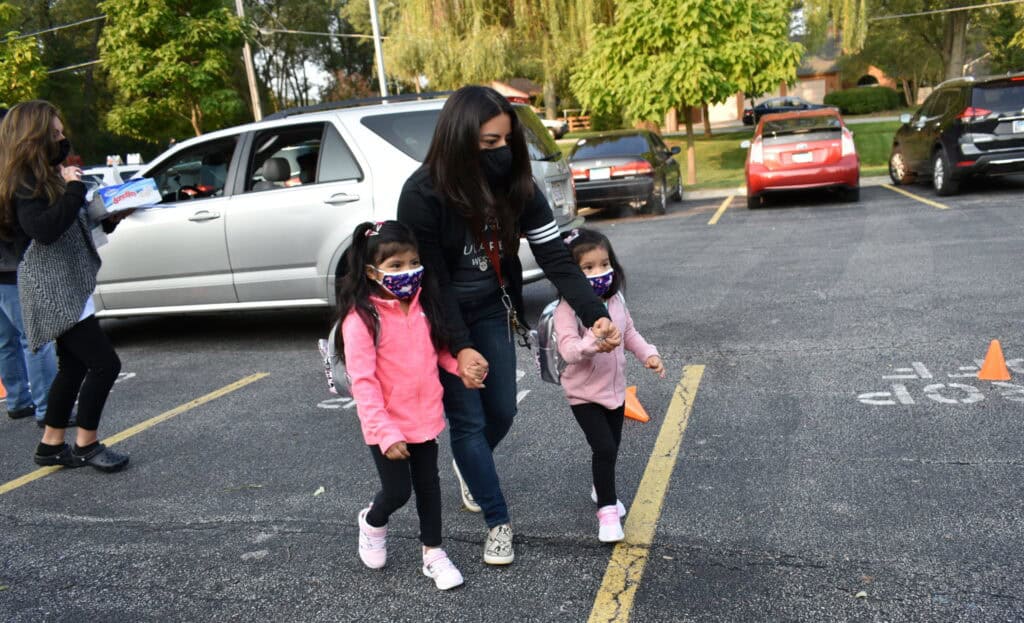How the Educare Learning Network Responded to Challenges and Leveraged Learning Opportunities
In this blog, Amanda Stein, director of research and evaluation, and Demi Siskind, research associate, share research findings about lessons learned from Educare schools and staff early in the pandemic and highlight equity-focused calls to action to better prepare and support early childhood care and education in the workforce for future crises.
In the advent of the COVDI-19 pandemic, early childhood care and education (ECCE) systems, programs and practitioners have faced uncertainty about how to safely care for, educate and serve young children and their families. Given the essential nature of ECCE programs, which provide foundational supports for children’s social emotional well-being and learning during a critical developmental period and enable many parents to go to work and/or school, the ECCE workforce had to quickly reinvent practices to operate programs and provide support safely, effectively and equitably. Furthermore, populations living in under resourced communities, which are often prioritized for publicly funded ECCE programs, were some of the hardest hit during this public health crisis, further exacerbating the ongoing pandemic of racial and economic disparities and systemic injustices among young children, their families and the professionals that serve them.
A Focus on Educare Schools’ Response to the Pandemic
Researchers from the Educare Learning Network team at Start Early and local evaluation partners conducted a qualitative study with Educare schools to examine their early response to the pandemic and how they navigated the shift to fully or partially remote programming and services for children, families and staff.
While some schools fully reopened early in the pandemic–with more limited enrollment due to social distancing requirements and other safety precautions–to serve children of essential workers, others took a gradual approach returning to in-person instruction and supports. Despite facing tremendous challenges as they reimagined virtual and socially-distanced ways of working and managed fear and health risks, resiliency of Educare leaders and staff emerged as a major theme of the study. ECCE leaders and staff served, and continue to serve, as crucial frontline workers themselves; Educare practitioners specifically articulated several priorities and successes when describing their efforts in providing supports and services to help young children, families and the workforce as they navigated the pandemic, including innovative approaches to:
- Facilitating more home-school, parent-to-parent, and staff-to-staff connections and social capital building opportunities;
- Emphasizing and supporting the mental and emotional well-being of both children and adults; and
- Getting information and resources to children and families in a variety of ways to meet their immediate needs.
To view the results of this qualitative study in greater detail, read our Educare Insights snapshots on:
- Supporting & Engaging Families During the Pandemic
- Supporting the Early Childhood Education Workforce During the Pandemic
- Teaching Learning with Young Children Durin the Pandemic
Watch the Webinar
To hear more from Educare staff about lessons learned during the pandemic, watch the webinar, Navigating Crisis: Early Education Insights from the COVID-19 Pandemic.
Key Learnings for Future of ECCE Practice, Policy and Research
ECCE programs and the workforce are truly indispensable, providing essential services to working families and cultivating the minds and skills of our youngest learners at a critical period of development. Future crises related but not limited to health, the economy, natural disasters and racism are inevitable. We must rethink our systems and advance program availability and quality, as well as research and policy agendas centered on equity, to ensure the ECCE field is prepared to navigate such challenges going forward.
Adequate and stable funding in a unified, integrated system is critical to sustain ECCE programs and services. Policies and investments supporting the initial and ongoing learning and development among the ECCE workforce are necessary for effectively and equitably preparing ECCE staff to maintain and continue programs during and after a time of crisis.
Upholding the physical and emotional well-being of young children, families and the ECCE workforce has been another primary concern throughout the pandemic and amidst ongoing systemic racism. Prioritizing safety and basic needs (e.g., housing, food, healthcare) first, in order to address other challenges like learning loss and family engagement in a remote world, will continue to help practitioners, policymakers and researchers rebuild and sustain community relationships after COVID-19.
Continue the Conversation
Interested in learning more about Educare? Introduce strategies from the Educare Learning Network to your school, center or community with The Essential Practices of Educare professional development series.
About the Authors
Amanda Stein, Ph.D., director, research and evaluation, Start Early, conducts research focused on the short and long-term outcomes of children and families participating in ECCE settings and advances high-quality practices and organizational conditions through professional development of leaders and practitioners.
Demi Siskind, Ph.D., research associate II, Start Early, centers her research on ECCE experiences among culturally and linguistically diverse populations, with an emphasis on Latinx/Hispanic young children and families, and advances equitable ECCE experiences through teacher preparation and development.
